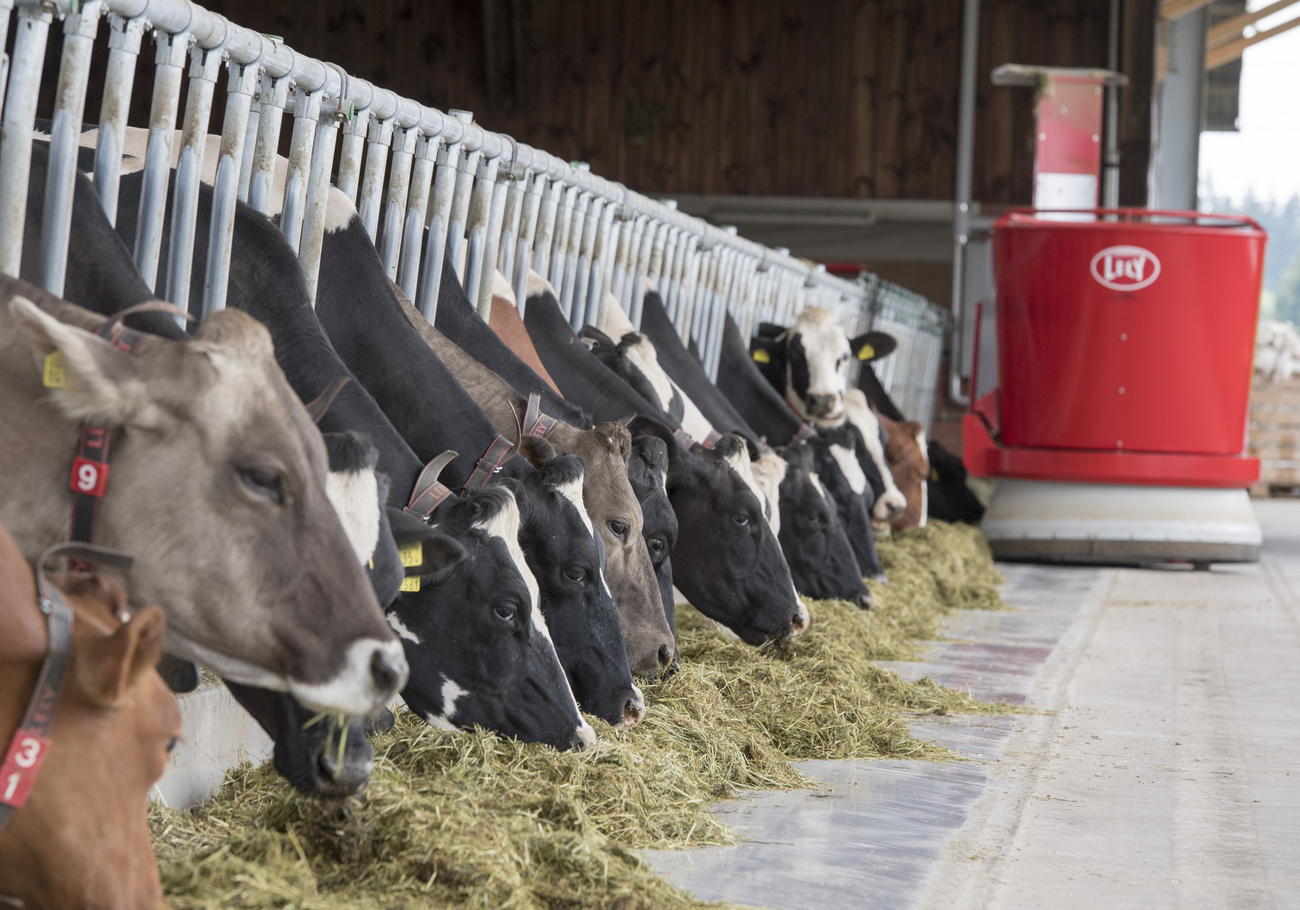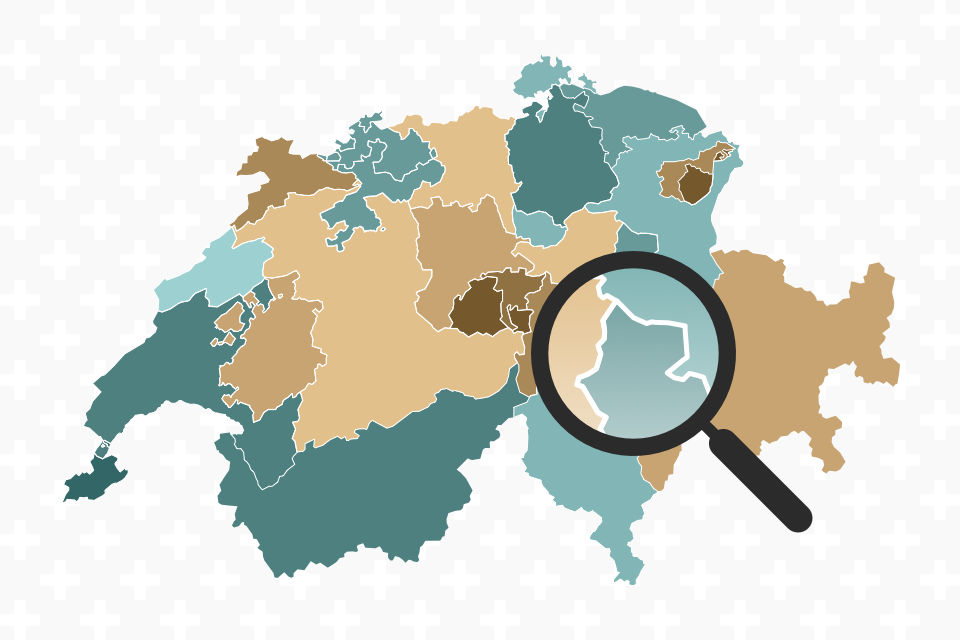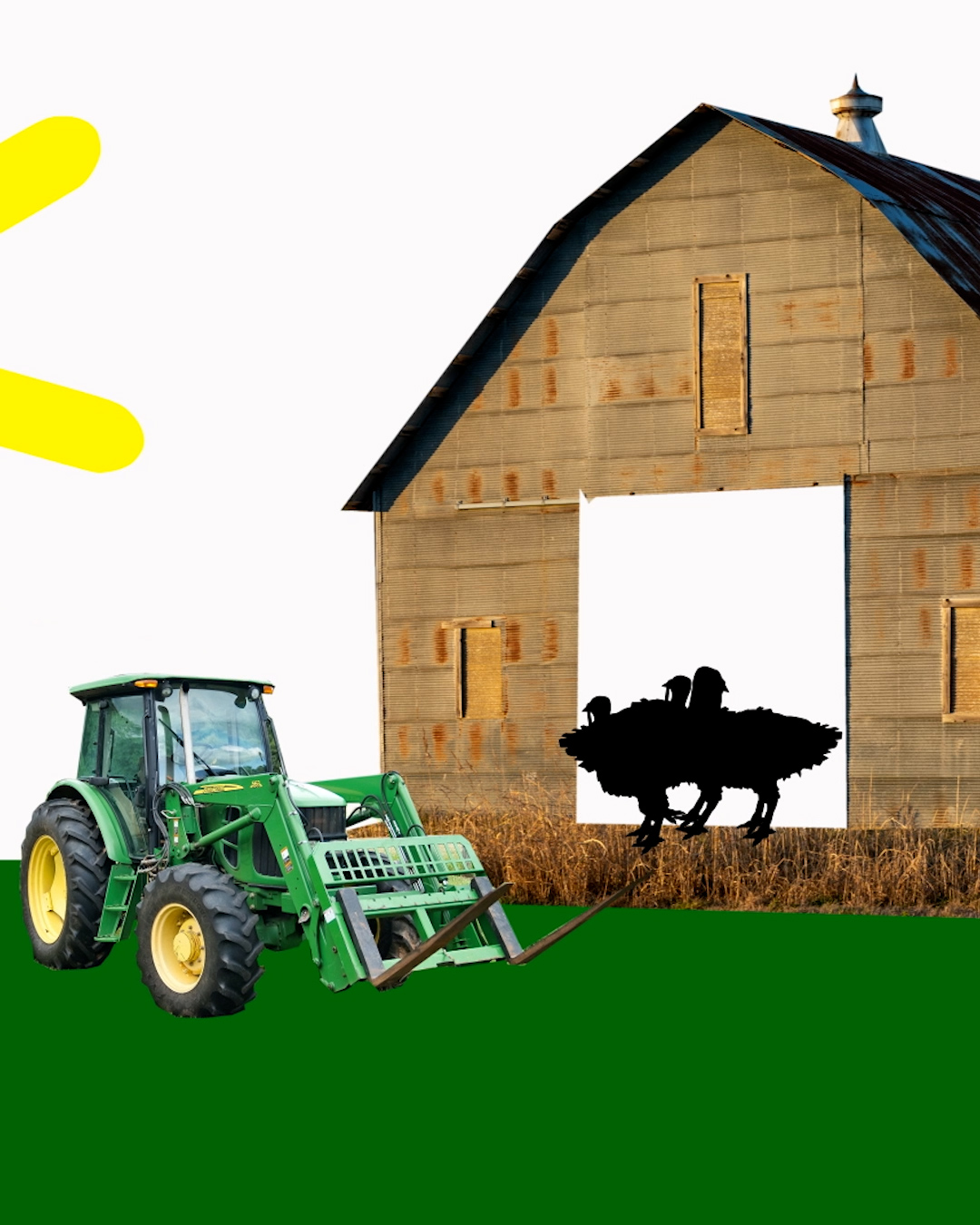What’s the best way to combat the environmental impact of intensive animal farming?
In Switzerland, citizens have sided with the majority of Swiss farmers and said no to a proposed “factory farming” initiative.
In the months before the vote, campaigners had argued that the proposal would give added dignity to farm animals and help Swiss agriculture to adapt to the global fight against climate change.
A majority of farmers, led by the Swiss Farmers’ Federation, fought against what they saw as an unfair attack on them, all in the name of achieving a wider societal goal of cutting down on meat consumption.
Do you agree or disagree with the vote results? Do you see a connection between animal farming and environmental impacts? Why or why not? And what could be other solutions?
From the article Swiss agriculture remains under pressure despite success at ballot box
I suggest that instead of eating meat, we eat vegetables.
It would be less burdensome and better for our health.
肉を食べる代わりに野菜を食べることを提案する。
そのほうが負荷が少ないし、我々の健康にもいいと思う。
To problems that must have solutions immediately, agriculture and the environment priority.
A problemas que devem ter soluções de imediato, a agricultura e o meio ambiente prioridade.
The best way to combat the environmental impact of intensive animal farming is to do everything to reduce the demand for its output.
People could discover and learn more about food, the food chain, enjoying real food, and how food and sharing it together is part of a culture that reduces stress, promotes health, and fosters relationships.
When that becomes clear again to all the junk food consumers, demand for intensive animal farming goes down and farmers will consider sustainable farming a more viable business model.
There is a role for the government here: making export of intensively-farmed products more difficult or more expensive, and running proper campains to inform consumers as I map out above. People have forgotten what the function is of eating, of preparing your own meals, and of sharing them.
Everyone wants to get back to nature, but no one wants to do it on foot
Todo el mundo quiere volver a la naturaleza, pero nadie quiere hacerlo a pie
I would say the formulated question is quite general and the answer is very broad and covers several aspects from animal health to what we ingest. Leaving aside the human health aspect I would focus on animal welfare aspect that I am more grasping. Any person who decides to breed animals must, therefore, have a deep understanding of their ethology, so as to set up a breeding based on the needs of species (of freedom, of relational life, of hygiene, of reproductive life, of play) creating a model that can respect animal nature, a condition that in intensive farming is structurally not possible to respect. In fact, industrial farming represents the human-managed farming system that, from domestication to the present day, has taken the animal as far as possible from its original nature. The need for space to establish hierarchy within the group, the need for grazing for a ruminant or rooting for a pig, are innate behaviors and must be respected; they are inescapable for health.
Direi il quesito formulato abbastanza generico e la risposta è molto ampia e riguarda diversi aspetti dalla salute degli animali fino a ciò che ingeriamo. Tralasciando l’aspetto della salute umana mi concentrerei sul benessere degli animali aspetto che sono più afferrato. Qualsiasi persona che decida di allevare animali deve, dunque, conoscerne profondamente l’etologia, in maniera da impostare un allevamento basato sulle esigenze di specie (di libertà, di vita di relazione, di igiene, di vita riproduttiva, di gioco) creando un modello che possa rispettare la natura animale, condizione che negli allevamenti intensivi non è strutturalmente possibile rispettare. Infatti, l’allevamento industriale rappresenta il sistema di allevamento gestito dall’uomo che, dalla domesticazione a oggi, ha portato l’animale il più lontano possibile dalla sua natura originaria. La necessità di spazio per stabilire la gerarchia all’interno del gruppo, il bisogno di pascolare per un ruminante o di grufolare per un suino, sono comportamenti innati e devono essere rispettati, sono imprescindibili per la salute.
Your question is worded in a particular way, rather generically. The answer can only be one. Evidently YES. A YES, BUT.
Every human activity impacts the environment. The topic is too complex to cover in a short journalistic article. Too many factors contribute. Population trends on both global and regional scales, natural events independent of climate phenomena, climate events themselves at all levels, the globalized economy, countries' policies, etc.
Multiple interventions have already touched on one or the other of the influencing factors.
To return to the question, the voting outcome reflects multiple feelings of the voting citizen. On the one hand, the continuous attacks on a highly developed system (our Swiss agriculture) has led to exasperation. On the one hand, the perception of healthy farming, fundamentally different from the intensive farming promoted by Switzerland. Not least was the wrong wording of the text on the ballot. The central goal, distorted, was indefensible. The campaign promoted by intiativists, without arguments, without personality, clashed against a well-organized and armed army, which was able to build consensus and dismantle fragile attempts to motivate NO.
La sua domanda è formulata in modo particolare, piuttosto genericamente. La risposta può essere solo una. Evidentemente SI. Un SI, MA.
Ogni attività umana ha impatto sull'ambiente. Il tema è troppo complessa da trattare in un breve articolo giornalistico. Contribuiscono troppi fattori. L'evoluzione della popolazione sia su scala globale che regionale, gli eventi naturali indipendenti dai fenomeni climatici, gli stessi eventi climatici a tutti i livelli, l'economia globalizzata, le politiche dei paesi ecc.
Più interventi hanno già toccato l'uno o l'altro dei fattori di influenza.
Per tornare alla domanda, il risultato del voto riflette più sensazioni del cittadino votante. Da un lato i continui attacchi ad un sistema estremamente evoluto (la nostra agricoltura svizzera) ha portato all'esasperazione. Da un lato la percezione di un allevamento sano, fondamentalmente differente da quello intensivo promosso dalla Svizzera. Non da ultimo la sbagliata formulazione del testo in votazione. L'obiettivo centrale, snaturato, era indifendibile. La campagna promossa dagli inziativisti, senza argomentazioni, senza personalità, ha cozzato contro un esercito ben organizzato e armato, che ha saputo creare consenso e smontare fragili tentativi di motivare il NO.
Innovative solution, Swiss has cows and more mountainous landscapes as it’s specialties and tourism branding strategy hence it’s more important for Swiss to start an economically friend method for farming.
I think we are focusing on the wrong side here. Before farming we shall look at all the factories which release not only CO2 but also toxic chemicals into the oceans. Oceans are big CO2 absorbers. Not to mention forests. Let’s first remove junk food factories, tobacco factories. Lets make more durable products, like those we had in the 80’s. Remember the days when we could use the same car forever? Or the same Jeans? Fast fashion, fast paced industries are those destroying the environment and not farming.
Exactly!
The big problem in dense animal farms is the production of methane gas, which exceeds carbon dioxide in its danger to the climate. However, we can consider this disadvantage as a major advantage if intensive animal production farms support green energy projects and methane gas production (natural gas) and support as well Organic farming without chemicals.
المشكلة الكبيرة في مزارع الحيوانات الكثيفة هي إنتاج غاز الميثان الذي يفوق ثاني أكسيد الكربون في خطورته على المناخ لكن من الممكن أن نعتبر هذا العيب ميزة كبرى لو دعمت مزارع الإنتاج الحيواني المكثف مشروعات الطاقة الخضراء وإنتاج غاز الميثان (الغاز الطبيعي) ودعمت كذلك الزراعة العضوية بدون كيماويات.
You can't limit it...because the Sustainability measures now give it as overtly and objectively harmful for the overall purposes of increasing Climate Change
Non si può limitare...perchè le misure di Sostenibilità lo danno ormai per dichiaratamente ed oggettivamente dannoso ai fini complessivi dell'incremento di Climate Change
ho that's good answer and farming is good objective for increase food quality and measure of population and there is no farming no food for lifestyle
The impact of Swiss agriculture on the global environment is quite negligible (!) especially on Co2 emissions. This is also why the population is no longer fooled by the hammering green-environmentalist propaganda in this area.
Regarding livestock farming, we are already one of the most Earth-friendly countries, as intensive livestock farms are not even comparable to much larger and animal disrespectful ones abroad.
Continuing to pound the nail - mental/ideological - that Switzerland would have an environmentally (?) unfriendly agriculture only adds to the discontent, both of farmers and consumers ! It would be time to focus on other far worse issues, such as manifestly excessive road traffic and absurd land speculation as well as excessive secondary residences with "cold beds."
L'impatto dell'agricoltura svizzera sull'ambiente globale è del tutto trascurabile (!) soprattutto per le emissioni di Co2. È anche per questo che la popolazione non si lascia più irretire dalla martellante propaganda verde-ambientalista in quest'ambito.
Riguardo all'allevamento del bestiame siamo già uno dei paesi più rispettosi della Terra, in quanto gli allevamenti intensivi non sono nemmeno paragonabili a quelli dell'estero molto più grossi e irrispettosi degli animali.
Continuare a battere sul chiodo - mentale/ideologico - che la Svizzera avrebbe un agricoltura poco rispettabile dell'ambiente (?) non fa che accrescere il malumore, sia degli agricoltori, sia dei consumatori ! Sarebbe ora di concentrarsi su altre tematiche ben peggiori, come il traffico stradale manifestamente eccessivo e la speculazione fondiaria assurda nonché le residenze secondarie eccessive con "letti freddi".
Step 1 - Vote against it. But in the land of farmers, I expected a no vote.
Interestingly Swiss Abroad voted for this initiative.[url=http://https://www.swissinfo.ch/eng/swiss-diaspora-more-supportive-of-pension-reform-and-animal-welfare/47931040?utm_campaign=teaser-in-channel&utm_medium=display&utm_content=o&utm_source=swissinfoch] https://www.swissinfo.ch/eng/swiss-diaspora-more-supportive-of-pension-reform-and-animal-welfare/47931040?utm_campaign=teaser-in-channel&utm_medium=display&utm_content=o&utm_source=swissinfoch%5B/url%5D
Instead, it was not voted "against," because the Swiss people are much less ideologically (!) deviant than people think. The work of the still remaining farmers should be supported and respected: other than always voting against by people who work in offices with their feet in the heat, their pay secure and their vacations guaranteed!
Invece non fu votato "contro", perché il popolo svizzero è molto meno deviato ideologicamente (!) di quanto si pensi. Il lavoro degli agricoltori ancora rimasti, va sostenuto e rispettato: altro che votare sempre contro da parte di gente che lavora in ufficio coi piedi al caldo, la paga sicura e le ferie garantite!
I often feel my vote is a wasted one, as I live in Farmerville. Their logic seems to be "how much will it cost me?" while mine is "what benefit does it bring to everyone?". It seems saving the planet is not top of their agenda. Maybe the Swiss Abroad have seen a more global impact. Here, we still have rivers, lakes, trees, green fields, snow in the mountains even if the glaciers are vanishing. The local Swiss vote won't change until we live in a desert, when it's too late.
Switzerland missed an historic opportunity to end conditions where:
-chickens have more room in the oven than during their short sad lives: ie one A4 sheet of paper.
-10 pigs exist in the space of one parking space, half of them never have access outdoors or have straw to lie on
-9 out of 10 animals never see the sky above until the day they are slaughtered.
I could go on.
The Farmers had 25 years to transition and would have been protected by import bans.
1’062’647 People voted for the farm animals, for an end to factory farming in Switzerland.
Despite not being enough to win the vote, the intensive campaign and media coverage ensured that this issue was on every dining table.
Time for the Retailers to match the Heideland images with reality by using their market dominance and power to support animal welfare and end the horrendously high margins they enjoy on animal label products. Actions speak louder than words.
This topic is not going away.
Let’s all keep pushing and build on this foundation for an end to factory farming, for a systemic change in our food systems where animals, the environment and the custodians of this vision are respected and can truly thrive.
The reality is that people can, like myself, choose to buy and eat free range, organic chickens. The cost is in the region of 15-20 Francs, can be higher.
People on low incomes cannot afford to pay such a high price for meat, nor can they afford the expensive meat alternatives, which incidentally are highly processed foods.
Therefore, for good nutrition, and strength, there must be a range of lower cost meats available.
You comment of "would have been protected by import bans."
This is not possible, the EU nor WTO would not allow this, nor would Brazil, from where Switzerland buys many chickens. It's not allowed under general trade agreements to block specific imports like this.
It's better for lower price chickens to be reared in Switzerland, under better conditions, than cheaper imports.
Can we start prioritizing a bit better?. What about removing all the junk food factories, tobacco and sugar industries. They cause millions of deaths and chronic illnesses every year. Also the fast fashion and fast everything, replace with durable products, like those we had in the 80s. Last year I bought a pair of jeans from Zara. They lasted two washings. Pure junk. I prefer expensive Levis that can last for few years. Same with technology amd everything. We change car every 5 years now. All this is pollution, CO2 and an immense amount of trash. And plastic? We buy 4 apples now wrapped in paper box and plastic? Does anybody notice this? Soo If this is not enough to improve the situation then we can discuss about basics like meat, fruits and vegetables. Putting into the frontline meat in the current circumstances obviously has nothing to do with the environment but with just another business segment.
Hello ANONA, I agree that there are many parts that have (a bigger or smaller) environmental impact. I also see that plastic wrappings, for example, result in a massive pollution of our environment.
In the weeks before the vote on the "factory farming" initiative in Switzerland there were voices that were calling for a ban of this way of farming because they see a connection between this and environmental concerns.
I am wondering now, do you see ways that would address these concerns?
I see a connection here in your contribution as well. The fast food and "throw-away" style of life. What would you say to prioritising sustainably sourced meat, e.g. from local farmers?
Well said: it's time to stop always picking on Swiss farmers who are now exasperated by the systematic and unjustified suspicion summit against them. Do you want to kill what is left of our agriculture?
Go ahead and exasperate the farming world, who will soon be forced to eat chickens and eggs from Asia! Not only that: but also foreign milk powder, lacking Swiss milk!
People are now archly fed up with these hysterical green-colored campaigns!
Ben detto: è ora di smetterla di prendersela sempre contro gli agricoltori svizzeri che ormai sono esasperati dal cima del sospetto sistematico e ingiustificato nei loro confronti. Volete uccidere quel che rimane della nostra agricoltura?
Continuate pure a esasperare il mondo contadino, che presto vi vedrete costretti a mangiare polli e uova provenienti dall'Asia! Non solo: ma anche del latte estero in polvere, mancando quello svizzero!
La gente è ormai arcistufa di queste campagne color verde-isterico!
I think that we should not even think about destroying or limiting the basics before we have attacked the real contributors to the destruction of the environment. I am afraid that this is just another strategy to put our food in the hands of wealthy corporations. What is the alternative then, vegan? This is another industry which will destroy even more the planet with highly processed foods. Before I lead a farmer and his family to go bankrupt I will ensure that all the non essential factories are closed and that all the rest of corporations clean up their garbage from the oceans, rivers, lakes and forests. CO2 is not the problem but the lack of resources the planet has to recycle it. Oceans and forests are a major CO2 absorbers which are mostly destroyed by big corporations that through chemicals and trash all over. What does farm animals do compared to that, just fart and poop. Thats all. I believe that the entire human population need more education about how nature works. The fact that so many people point out farming is scary because this ignorance makes us vulnerable to any sort of manipulation and exploitation. Let’s grab some books people, lets visit some farmers, they know how life works better than we do.
I honestly think that Switzerland is the least of the global warming concerns. Seriously. It will not make any difference doing anything more in Switzerland if China and the US continue at that pace. This is exactly my point, wrong priorities here which will lead to wrong decisions and actions. We must not touch farming and agriculture in Switzerland. We can live without chocolate and chips potatoes and even without cereals. But we cannot live without fruits, vegetables and meat. These are by far the most nutritionally dense foods, the less processed, most natural and healthiest.
Since the 2996 Un- report (FAO) .
"Livestock's Long Shadow" it is clear where the main source of climate change is. However, this is excluded from the outset at every UN conference. Now nature is starting to fight back and the future will tell. It has been known for many years: What man sows, that he will reap. And the result will be very, very cruel for many.
Seit dem 2996 erschienen Un- Bericht (FAO) .
"Livestock's Long Shadow" ist es klar, wo die Hauptquelle des Klimawandels ist. Diese wird aber bei jeder UNO-Konferenz zum vornherein ausgeklammert. Nun beginnt sich die Natur zu wehren und die Zukunft wird es zeigen. Seit vielen Jahren ist es bekannt: Was der Mensch säet, das wird es ernten. Und das Resultat wird für viele sehr, sehr grausam sein.
When governments stop subsidizing the animal industries, when consumers start paying the true costs of meat, dairy, and eggs, then most people will make the choice to go vegetarian.
Hello NICK KYRIAZI, thank you for your input. What do you mean by "true cost" exactly?
I will never be vegan. It is not healthy for me. But the planet we can save by simply cleaning up our trash and stop producing junk. Don’t you realize that the finger is now pointing the meat industry because there is a long like of multi billion value vegan products industry waiting to be launched?
It's a lifecyle that both Animal farming and Food farming are intertwined. One depends on the other. Would well appreciate if you would look at Soil4climate and the Regenerative Agriculture and do the comparisons. Its no rocket science to understand the dependancy of each other.
Bigger...faster...more of it...only creates more problems which harm our environment. This constant mass production of just about anything can't bode well.
Hi VERAGOTTLIEB, what do you think realistic solutions could be?
We are suffocating in our own 'everything' - we have reached the point of no return. But this shouldn't mean that we give up still trying to keep our planet livable. The Western (white) world doesn't know anymore what it means not to waste, instead we 'clean up' by dumping our collective garbage on Third World countries...and pay them so our conscience doesn't hurt too much. As I see it, a big contributor to all this is also KILLER KAPITALISM which knows no limits.
In the past decade the eco-extremists have somehow convinced large parts of society that the individual is to blame for all environmental problems, that he/she must cut down on meat, flying, etc.
Eating meat isn't the biggest environmental issue, neither is flying. Wasting food, industry, road transport, emit more CO2 than meat eating or flying.
Meat is a very compact, energy and nutrient rich food. It's benefits to humanity outweight the downsides.
I like this post and I agree that WASTAGE is the worst enemy.
In a modern restaurant serving "all you can eat" buffet, there are monetary penalties when one takes the food and does not eat it (waste). Why we cannot implement such a strategy to supermarkets and restaurants? Because we are lazy.
Just walk into any supermarket. You will observe that 80% of what is on the shelves is junk (candies, chips potatoes, cereals with lots of sugar, more refined carbohydrates and more packed jink food). Apart from that take sofas, alcohol, tobacco and all sorts of objects that nobody needs but we buy because we are bored. Now calculate the environmental damage. If we remove all that we will eliminate the problem woth the environment. Meat is the most natural food source and putting it into the line of cause for pollution only means that there is a lot of money at the stake from the vegan industry, which will only bring more pollution and junk. Don’t fall for this. Governments, Corporations specially do not care about your health neither the environment.
Some sobering facts regarding meat and dairy:
Worldwide, 14.5 per cent of greenhouse gas emissions come from livestock farming, according to the UN Food and Agriculture Organisation (FAO).
According to Agroscope, in Switzerland today an average of about two tonnes of CO2 equivalent are emitted per year and per inhabitant for food alone.
According to a 2018 report by GRAIN and the Institute for Agriculture and Trade, together, the world’s top five meat and dairy corporations were already responsible for more annual greenhouse gas emissions than Exxon, Shell or BP.
The current and anticipated greenhouse gas emissions stemming from meat production is not sustainable from a CO2 zero target perspective nor from a biodiversity perspective.
Hence the urgent recommendations from the FAO, Eat Lancet study and multiple scientific studies for a major reduction in meat consumption in favor of a more balanced and healthier increase in a plant based diet.
The Initiative would have certainly contributed to this solution.
It would have helped to fulfilled the need for a more sustainable and humane form of animal agriculture.
It would have protected farmers with an import ban on products which did not fulfill the new standards and provided them with a 25 year transition period.
A missed opportunity for Switzerland, but I have no doubt that the pressures of climate change and the rise of meat alternatives will lead us down this road anyway.
All human activity produces CO2. We have to decide what is important, and what is superfluous. Growing highly nutritious and healthy meat and other foods have to be a high priority.
Replacing meat with highly processed, expensive, vegan foods with additives and preservatives is not the answer...except for those profiting from selling this food which has huge profit margins for the corporations who make it.
Due to the looming energy crisis, we will probably have to reduce meat consumption anyway.
On paper, the initiative could have brought a level playing field between local farmers and imported goods. It simply lacked exceptions that the federal government could have taken.
A dilemma of the initiative may lie in text with "protects the dignity of the animal." For some, the federal government does not even manage to protect the dignity of humans, so how can it credibly protect the dignity of an animal?
And as long as peace-loving creatures like sheep and deer in Switzerland have to be afraid to be injured and bleed to death in an extremely cruel way, the initiative seems questionable to some. If one would deal as humans in such a way with the animals then one would have rightly annoyance with the animal protection. If one would like to offer really the animals a life in the dignity, then one would have to catch after today's Wording first all carnivores, "their problematic behavior therapieren" and them "the advantage of a completely vegan nutrition convincingly explain". Or differently expressed; one cannot be credible for animal protection and at the same time for the right to fist among animals with e.g. predators.
Auf Grund der drohenden Energiekrise wird man wohl sowieso der Fleischkonsum reduzieren müssen.
Die Initiative hätte auf dem Papier eine Chancengleichheit zwischen den lokalen Bauern und Importgütern bringen können. Es fehlten einfach Ausnahmeregelungen die der Bund hätte ergreifen können.
Ein Dilemma der Initiative mag in Text liegen mit "schützt die Würde des Tieres". Für manche schafft es der Bund nicht einmal die Würde von Menschen zu schützen, wie soll er da glaubwürdig die Würde eines Tieres schützen?
Und solange friedliebende Lebewesen wie Schafe und Rehe in der Schweiz Angst haben müssen auf äusserst grausame Art und Weise verletzt und verbluten zu müssen wirkt wohl die Initiative auf somanche gelinde gesagt fraglich. Würde man als Mensch so mit den Tieren umgehen so hätte man zurecht ärger mit dem Tierschutz. Wenn man wirklich den Tieren ein Leben im Würde bieten möchte, dann müsste man nach heutigem Wording zuerst alle Raubtiere einfangen, «ihr problematisches Verhalten therapieren» und ihnen «dem Vorteil einer vollkommen veganen Ernährung überzeugend darlegen». Oder anders ausgedrückt; man kann nicht glaubwürdig für Tierschutz und zugleich für das Faustrecht unter Tieren mit z.B. Raubtieren sein.
Hi FRODO, I find the equal opportunity for local farmers an interesting point. What exemptions would you have considered appropriate?
Hallo FRODO, die Chancengleichheit für die lokalen Bauern finde ich einen interessanten Punkt. Welche Ausnahmeregelungen hätten Sie für angebracht gehalten?
Why meat? Why not stop buying junk food and fast fashion?






Join the conversation!